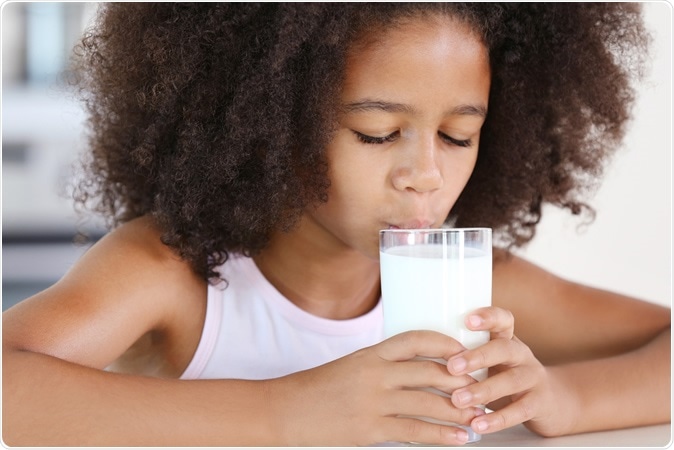A new study has shown that there might be a very slight difference in heights of children drinking cow’s milk compared to those drinking dairy alternatives such as rice, soy or almond milk.
The study appearing in American Journal of Clinical Nutrition this Wednesday showed that with each cup of non-cow’s milk consumed daily there was a 0.4 centimeters (0.15 inches) lesser height change than was average at the child’s age. On the other hand for every daily cup of cow's milk, the kids were 0.2 centimeters taller than average kids of their age.

Image Credit: Africa Studio / Shutterstock
Dr. Jonathon Maguire, who led the study, is an Assistant Professor of Pediatrics at the St. Michael's Hospital in Toronto. He said that for a three year old child taking three cups of non-cow's milk compared with another taking same amount of cow’s milk, the height difference is on average 1.5 centimeters whereby the one taking non-cow’s milk is shorter. This half an inch difference may not seem like much but is a significant one at the age of three he said.
For this study Dr. Maguire and his team included 5,034 healthy Canadian children between ages 2 and 6. Average age of the studied group was 38 months and 51% of the children were male. The recruitment of the kids was from nine different family and paediatric health-care practices between December 2008 and September 2015. It was noted that around 5% of these children were regular drinkers of non-cow's milks exclusively i.e. they never drank cow’s milk. Also 84% of the kids drank only cow’s milk. Further 8% of the children drank both types of milk and 3% did not drink any milk whatsoever. Maguire explained that the shorter children were those that consumed lesser amounts and the correlation was significant.
The researchers took into account other factors among the participants including age, gender, body mass index (BMI), family income, mother's height and ethnicity. They did not look at other inclusions in the child’s diet and also did not ask the specific type of cow's milk alternative the child was drinking.
The important question is whether it matters? Researchers question if a difference of half an inch at three years of age really matters in adulthood stature and growth. Maguire explains that it remains to be seen how these children grow into adulthood. However being in a certain percentile of height and weight group at certain ages does seem to impact adult growth and stature he explained. While it is possible that the kids who are lagging a bit behind may catch up later, most kids at certain height-weight percentiles tend to remain on the same lines of growth well into adulthood he clarified.
Other researchers however have said that this study included only milk consumption as a measuring parameter correlated with height where as there may be several other issues. Other factors in the diet of the child could also play a role in height and it may not be milk at all that is responsible for the child’s height. Researchers advise parents of children who are on plant based milks such as soy milks not to switch to cow’s milk based on this study alone. Nutritionists would advise parents to ensure that their children are getting enough proteins from other sources along with dairy products. This can compensate for the difference they suggest. Maguire however says that marketing of the non-cow milk beverages should be more regulated and claims that these non-cow milks are “of similar nutritional value” as cow’s milk should not be made.